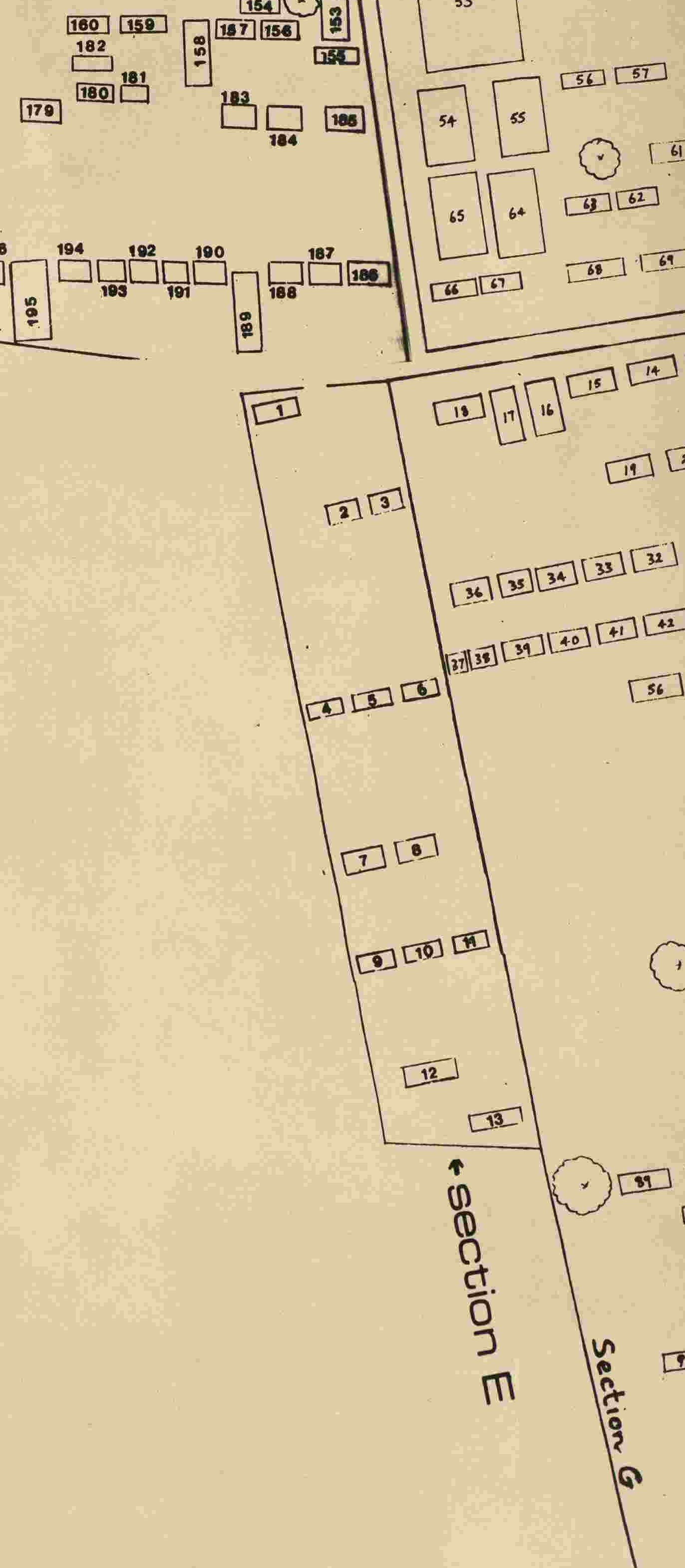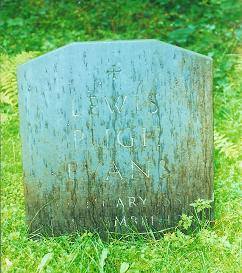LLANBADARN CHURCHYARD by A W GILBEY
SECTION E
New Paragraph
I am grateful to the Rev. Neil Cox for permission to include his photograph of the E12 headstone
El
Cuthbert Clifton. 26 March 1906 - 10 October 1953
E2
Dennis Arthur Lindsay Lyell. 17 July 1899 – 29 August 1962
E3
Gladys Gwendolyn Alice Lyell. 26 November 1902 - 29 October 1934
E4
George Griffith John Greer. 11 November 1905 - 28 June 1980.
E5
Alice Mary Greer. 26 February 1874 - 18 April 1955.
E6
Richard Townsend Greer. 14 October 1854 - 31 January 1942.
E7
Gladys Elizabeth Clifton. 28 January 1911 - 10 October 1963.
E8
Gladys Clifton. 28 July 1876 - 3 August 1955
E9
Betha Mllicent Evans . 6 September 1882 - 28 December 1954.
EI0
Gwyneth Veronica Evans. 22 May 1888 - 31 October 1951.
Ell
Griffith Pugh Evans . 11 February 1879 - 26 July 1946.
E12
Lewis Pugh Evans. 3 January 1881 - 30 November 1962.
E13
Griffith Eric Carbery Vaughan Evans. 19 February 1920 - 3 July 1950.
This section of the Churchyard of St. Padarn's Church, Llanbadarn Fawr, is used exclusively for burials by the Evans family, owners of the Lovesgrove Estate. The Evans family also have a vault in the older, closed section of the Churchyard at A139.
When Sir Griffith Humphrey Pugh Evans died in 1902 he left three sons and four daughters and the Lovesgrove estate passed to one of his sons, Lewis Pugh Evans.
Lewis Pugh Evans was the second son of the Evans family and he was educated at Eton and Sandhurst before entering the Army with a commission in the Black Watch with whom he served in the Boer War in South Africa: there he received the Queen's Medal and later the King's Medal.
After service with the Black Watch in India Lewis Pugh Evans returned to England and obtained a pilot's certificate and when the First World War broke out in 1914 he was posted as an observer with the Royal Flying Corps but after a few months he returned to the Black Watch and in 1917 was appointed to command the First Battalion of the Lincolnshire Regiment and in 1928 he retired from the Army.
In 1917 Lewis Pugh Evans earned the Victoria Cross for his 'conspicuous bravery and leadership' in an action on the Western Front. At Zonnebeke on the 4th of October, 1917, he took his battalion in perfect order through a terrific enemy barrage and led them into the assault. The battalions advance was held up by enemy fire, which caused many casualties, from a machine-gun emplacement until Lewis Pugh Evans rushed the enemy armed with his revolver and forced them to surrender. Al though twice severely wounded in the action he continued to lead and direct his men until they had won their objectives. Lewis Pugh Evans was mentioned in despatches no less than seven times and his other medals and awards included the D.S.O and Bar; the 1914 Star and Clasp; the British War Medal; the Victory Medal; the Order of Leopold of Belgium and the Croix de Guerre: he was also a Companion of the Order of St Michael and St George.
On his retirement from active service Lewis Pugh Evans returned to Lovesgrove here he took an active part in the life of the community and was well respected in the district. He maintained his interest in military matters by accepting the position as Honorary Colonel of the Cardiganshire Army Cadet Force and was for 25 years President of the Aberystwyth Branch of the British Legion. He aIso served during the early part of the Second World War as a Military Liason Officer at the Headquarters of the Wales Region. Lewis Pugh Evans took a great interest in agriculture and frequently took part in local agricultural shows. He was a Churchwarden at Llanbadarn and a Justice of the Peace on the local bench as well as Deputy Lieutenant for Cardiganshire and a Freeman of the borough of Aberystwyth.
Lewis Pugh Evans was married in 1919 to Dorothea Margaret Seagrave, eldest daughter of John Carbery Pugh Vaughan Pryse-Rice and his wife, Dame Margaret, of Llwynybrain, near Llandovery. The couple had one son, Griffith Eric Carbery Vaughan Evans, before the death of Margaret in 1921.
Griffith Eric Carbery Vaughan Evans was, like his father, educated at Eton and also served in his father's old regiment, the Black Watch, as well as the Argyll and Sutherland Highlanders during the Second World War. He was married to Barbara, daughter of Philip Noel Rogers of London and they had two sons. The eldest, Christopher Lewis Vaughan Pryse Evans inherited the Lovesgrove estate on the death of his grandfather.
Betha Millicent Evans was the fifth child and third daughter of Sir Griffith Evans and Gwyneth Veronica Evans was her youngest sister. Both took a keen interest in the work of the Red Cross and the younger sister worked in the Red Cross Hospital at Aberystwyth during the First World War. Both sisters also helped to run and organise the Women's Voluntary Service for the Aberystwyth area. Betha Millicent also supported the Girls' Friendly Society and for over 50 years worked on behalf of the Soldiers and Sailors Family Association. Gwyneth Veronica worked tirelessly on behalf of the Girl Guides and on behalf of the Parish Church which she loved so much at Llanbadarn.
Alice Mary Greer was the eldest daughter of Sir Griffith Evans and married Richard Townsend Greer in 1902. At that time he was Chairman of the Calcutta Corporation though he was later to become commissioner of Behar and Orissa, Inspector General of the Police of Bengal and a member of the Governors Executive Council. He was the fifth son of the Rev. George Greer, rector of County Down and was educated at Trinity College, Dublin. A keen rugby player he represented the College, the Wanderers and the North of Ireland and gained international honour in 1876 when he played, as one of a team of twenty, for Ireland. In 1877 he entered the Indian Civil Service where he rapidly rose to prominence; a Freemason he was to be Deputy Grand Master of Bengal. A prominent figure in Calcutta he set up the Indian Youth Athletic Club and was awarded the Companionship of the Star of India in 1904. In 1912 the couple returned to Llanbadarn Fawr to live at Dolau and Richard became a J.P. in 1917; the couple had four children of whom three survived.
Gladys Gwendolyn Alice Lyell was the third child of Richard and Alice Greer and she married Arthur Lindsay Lyell at Llanbadarn in October 1931 but died three years later at Calcutta.
Griffith Pugh Evans was a son of Sir Griffith and Lady Evans. He was educated at Magdalen College, Oxford, where he gained a honours degree in History, and he was called to the Bar at Lincoln's Inn. He served as a Justice of the Peace on the Llanbadarn Bench for 42 years. As a young lad of 13 he was struck by a paralysis which he overcame to lead an active life. A keen huntsman with the Gogerddan Hounds he was an accomplished horseman and a lover of country sports especially fishing. In the First World War he saw active service with armoured cars in France, Belgium, Russia and Rumania and was awarded the Croix de Guerre with Palms, the Order of Stanislaus and Officer of the Crown (Russia) and the Chevalier of the Star of Rumania. After the war he became a farmer at Home Farm, Lovesgrove, and took a keen interest in the improvement of agriculture. A supporter of agricultural Shows he was nearly killed at Talybont Show in 1938 when an upturned carriage drawn by a frightened horse smashed through a table on which he was leaning and he broke his thigh falling off a horse at the age of 64. A supporter of Llanbadarn Church he was also a staunch Conservative. He was President of the Trefeurig Branch of the British Legion and a member of the Governing Body of the Church in Wales, of the Territorial Army Association and of the Parish Council.

